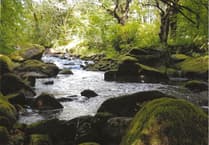THE right to wild camp on Dartmoor has returned, after Dartmoor National Park Authority successfully appealed against a ruling brought against the park authority by a wealthy landowner last winter.
The landmark appeal follows a legal battle between the Park Authority and Dartmoor landowner Alexander Darwall last winter, in which Darwall successfully convinced the court that the legal right to camp on the moor never actually existed, despite it being commonly believed that the right had been enshrined in Dartmoor’s byelaws since 1985.
The sudden ending of this decades-old assumed right triggered public outcry across Devon and beyond, prompting a thousands-strong rally on Stall Moor – Darwall’s land, last January.
Shortly after the ruling, the DNPA organised a permissive agreement, in which landowners would be paid with tax payer money to allow backpackers to continue to camp on their land.
The agreement was widely criticised for using public money to pay for what was already a right, and that the agreement could be withdrawn at the whim of the landowners. The DNPA therefore decided to appeal the ruling.
What the appeal is hinging upon, as indeed was the original case, is what is meant in the byelaws by recreation. Darwall’s legal team argue that camping is not recreation and is therefore not included in the ‘right of access to the commons for the purpose of open-air recreation’ in the byelaws.
They also argue that the right to camp interferes with landowners’ property rights. DNPA lawyers assert that recreation ‘undoubtedly includes camping’ and that if it was ruled otherwise, almost every other activity on the moor would also not count as recreation. Lawyers also argue that the original verdict had not considered the ‘wider public interest.’
After a two week wait, the appeals court panel, consisting of Sir Geoffrey Vos, Lord Justice Underhill and Lord Justice Newey, ruled that wild camping did count as open-air recreation and should therefore be allowed on the commons.
Vos said: ‘In my judgment, on its true construction, section 10(1) of the Dartmoor Commons Act 1985 confers on members of the public the right to rest or sleep on the Dartmoor commons, whether by day or night and whether in a tent or otherwise.’
While Darwalls lawyers argued that being in a tent could not count as ‘open air recreation’, and nor could falling asleep, the court decided otherwise.
Lord Justice Underhill said it was: ‘a perfectly natural use of language to describe that as a recreation, and also as occurring in the open air, notwithstanding that while the camper is actually in the tent the outside air will be to some extent excluded.’
Pamela Woods, Chair of Dartmoor National Park Authority, said:
'We are delighted with the Court of Appeal’s conclusions in this landmark case.
'We firmly believed the legislation which formed the focus of this case – the Dartmoor Commons Act – allowed for backpack camping on certain areas of common land as a form of open-air recreation without the need to get landowners permission first. We are pleased it was a unanimous verdict from the three judges who heard the case.'
Dr Kevin Bishop, Chief Executive/National Park Officer for Dartmoor National Park Authority, said:
'Today’s judgment is a re-affirmation of the right to backpack camp on Dartmoor and secures that right for today and future generations. This means people can experience the joys of backpack camping on Dartmoor, provided everyone follows the leave no trace principle and, critically, only camp in the areas that are identified in the online backpack camping map that is on the Authority’s website.
'We have sought to defend the public’s right to enjoy the National Park though this case. It is equally important that those exercising that right recognise that they have a responsibility to help look after the National Park – we want people from all parts of our society to enjoy Dartmoor responsibly and with respect to landowners, farmers and local communities.
'We would like to thank the huge numbers of people who have supported us publicly and privately with this case. Our sincere hope is that this judgment means we can now move forward, in partnership, with a focus on making sure Dartmoor remains a special place for all to enjoy.'
Kate Ashbrook, the general secretary of the Open Spaces Society, said:
'This is an excellent outcome. We are relieved that the judges ruled unanimously and conclusively that open-air recreation includes backpack camping on the commons. We should like to see that right extended, and we shall campaign with other organisations to achieve this.'
Lewis Winks, a campaigner with The Stars Are For Everyone, said:
'A permission is not the same as a right – and today the court has seen sense and re-established people’s right to camp without needing permission in Dartmoor National Park. Fundamentally this means that access to a night under the stars on one of the UKs most iconic landscapes now does not rely on the whims of individual landowners but is owned by ordinary people. We hope this will now serve as a blueprint for other places to follow suit.
'Nature-connectedness in the UK is the lowest across the whole of Europe. We must extend guaranteed rights of access across the UK. Of course, this has to be done responsibly, no one seeks to destroy the very thing we so need connection to, but we cannot even begin to properly have those discussions until the rights now offered on Dartmoor are extended more widely.
'For this reason, and encouraged by today’s ruling, we will continue to push for a new Right to Roam Act for England that defends and extends the public's right to access nature.
'We thank all those that have supported the campaign to date, and thank the officers and members of Dartmoor National Park Authority for pursuing this case.'





Comments
This article has no comments yet. Be the first to leave a comment.